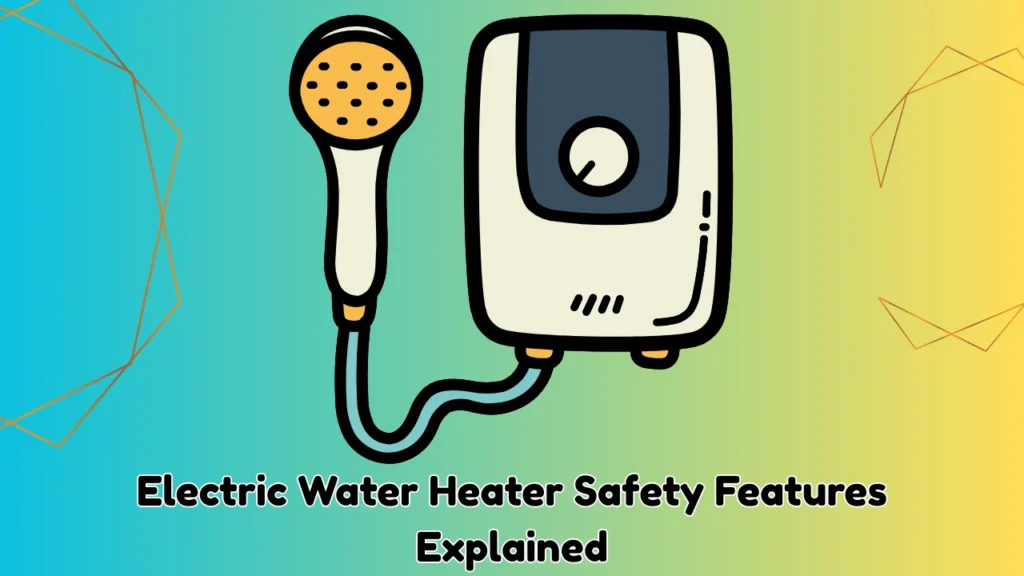A warm shower can be one of the most indulgent parts of your day, a little slice of calm before the chaos begins, or a soothing end to a long one. And behind the luxurious comfort is a silent workhorse: your electric geyser. It is the kind of appliance you rarely think about until something goes wrong.

While many of us focus on how fast a water heater warms, we often overlook the most critical element: safety. In modern homes, where design meets technology, electric water heaters are expected to offer not only utility but also reassurance. Because when you combine electricity, water, heat, and pressure, safety becomes more than a feature; it becomes a necessity.
Not Just a Hot Shower; A Smart One
An electric water heater for bathroom use is more than just a utility tucked away in the corner. It is a part of your lifestyle, your routine, and your personal comfort ecosystem. With that role comes responsibility; it should work efficiently, heat quickly, and more importantly, act smartly in times of malfunction.
Whether you live in a spacious villa with a luxurious bathroom setup or a modern city apartment with a small electric geyser discreetly mounted on the wall, your expectations remain the same: reliable warmth with no compromise on safety.
And as homes become more refined, consumers are no longer just choosing convenience; they are seeking assurance. Assurance that the appliance won’t overheat. That it won’t leak or burst under pressure. That your morning routine won’t come with hidden risks.
The Hidden Risks You Might Be Ignoring
It is easy to assume your electric hot water heater is safe simply because it hasn’t caused problems yet. But behind the walls and pipes, a combination of high voltage and high temperature is at work every day. Without proper safety measures, it can quickly become hazardous.
Common risks include:
- Overheating due to thermostat failure.
- Electrical short circuits from water seepage.
- Pressure builds up inside the tank.
- Burns or scalding from uncontrolled hot water flow.
These aren’t theoretical dangers; they are real issues that can cause serious harm. But unfortunately, many users don’t discover the problem until it’s too late.
That’s why prevention through design is the smartest path. Investing in a water heater with built-in safety features ensures you never have to worry about these risks, even during long-term use.
What Makes an Electric Geyser Truly Safe?
Not all electric geysers are created equal. While basic models may focus solely on functionality, premium electric water heaters incorporate intelligent safety features that operate quietly in the background to keep your home secure.
Here are the key features you should look for when selecting anelectric geyser:
Thermostat Control
Regulates water temperature and prevents it from crossing safe thresholds. This not only ensures comfort but also guards against accidental burns.
Thermal Cut-out
Automatically shuts off the power if the internal temperature exceeds the maximum limit. It is your first line of defence against overheating.
Pressure Release Valve
Vital for relieving excess pressure in the tank, especially if the water is heated beyond expected levels.
Shock-proof and Rust-proof Body
In moist, enclosed bathroom environments, these features reduce the risk of electrical faults and prolong the heater’s life.
Child Safety Lock
Adds an extra layer of protection by preventing children from accidentally turning up the heat or activating the heater without supervision.
These are not just specifications; they are safety nets that work every day to protect your home and family without you even noticing.
Small Electric Geyser? Think Big on Safety
Compact doesn’t mean compromised. In fact, many of today’s small electric geysers come loaded with smart safety features in a space-efficient design. Ideal for studio apartments, powder rooms, or secondary bathrooms, these models may be minimal in size, but they are robust in functionality.
With intelligent sensors, thermal insulation, and energy-efficient operations, a compact geyser offers you the same peace of mind that you expect from a full-sized unit. It is proof that premium performance doesn’t always require more space, just smarter engineering.
Because Luxury Deserves Reliability
Think about it: you have invested in designer tiles, mood lighting, and high-end fixtures to create the perfect bathroom. Why let an outdated or basic water heater spoil the experience?
A modern electric water heater for bathroom from brands like Jaquar must align with your overall vision of luxury and reliability. You are not just paying for hot water; you are investing in a system that senses danger before you do and neutralises it without a fuss.
From early-morning routines to late-night showers, your geyser should be as trustworthy as it is powerful.
How to Get Rid of Cockroaches Naturally.
In Conclusion
When it comes to your electric water heater, safety is more than a feature; it is a promise. A promise that every bath will be peaceful, and every shower will be secure. So, whether you are upgrading to a high-performance electric hot water heater or choosing a sleek, small electric geyser for a compact space, remember: comfort may be what you seek, but safety is what truly completes the experience.
Because luxury isn’t just about how it looks, it’s about how safe and confident it makes you feel.
Choose Jaquar, where design meets dependable safety.
FAQs
1. Why are safety features important in electric water heaters?
They prevent overheating, electrical shocks, and water pressure build-up, ensuring safe daily use.
2. What safety features should I look for in an electric water heater?
Look for a thermostat, thermal cut-off device, pressure release valve, and an Earth Leakage Circuit Breaker (ELCB).
3. Can safety features reduce the risk of accidents at home?
Yes, they significantly lower the chances of burns, short circuits, or water leakage mishaps.
4. Do advanced safety features improve the heater’s durability?
Absolutely! Built-in protection helps prevent damage to internal components, extending the appliance’s life.






